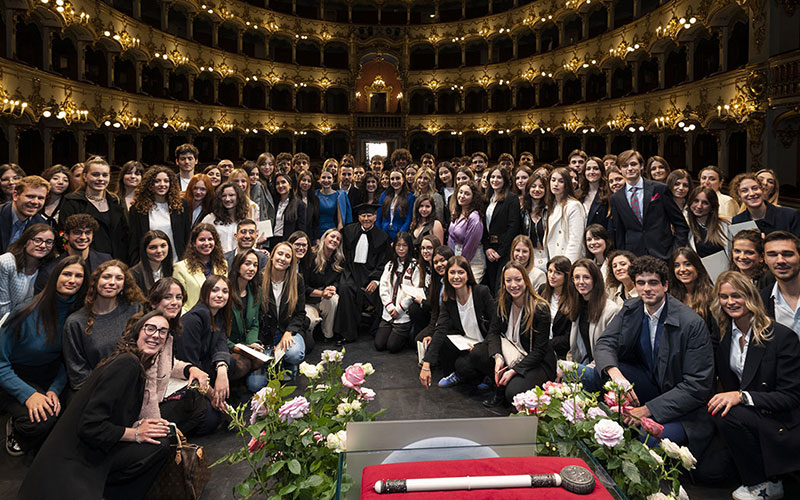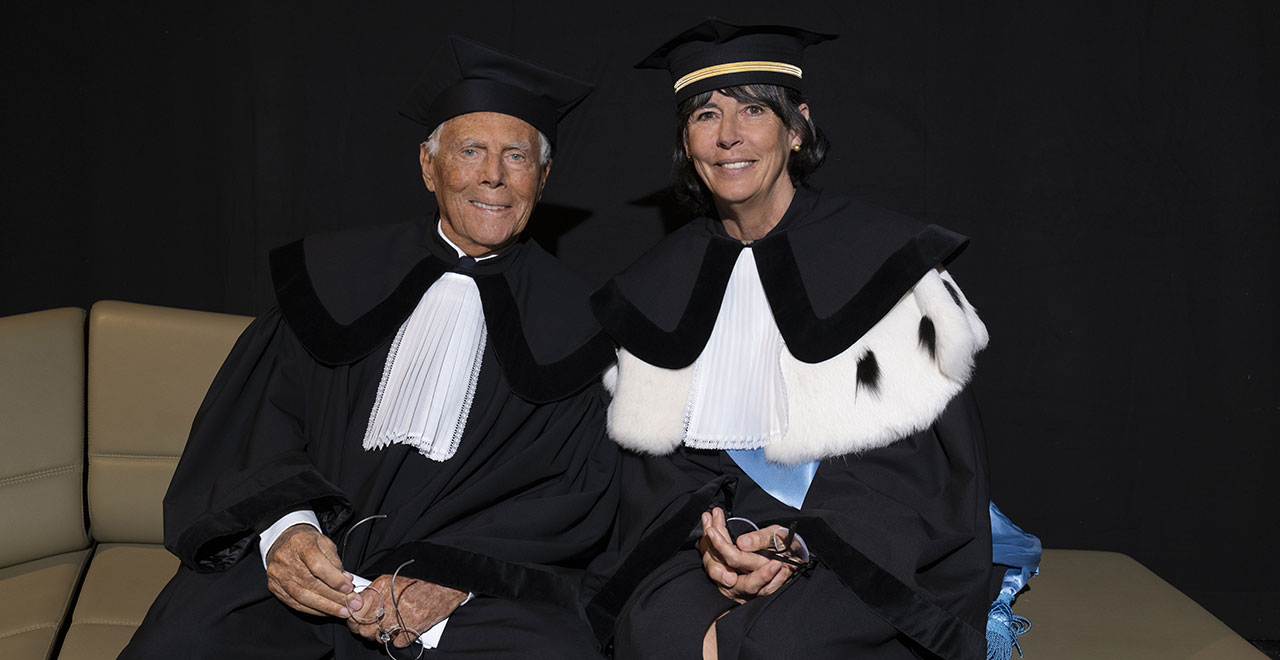
News | Piacenza
Giorgio Armani receives honorary degree in Global Business Management
| Francesco Berlucchi
12 maggio 2023
Condividi su:

Giorgio Armani was born on 11 July 1934 in Piacenza. From 1949 Milan has become his city, where he took his first professional steps in 1957 at 'La Rinascente', an emblematic place of rebirth after the devastation of the war. The economic ferment of that period is also expressed in the search [CC1] for a style of clothing, furnishing, accessories for everyday life and leisure, in which the intuition of the new needs of a society animated by the desire to grow without stripping itself of its culture, is combined with a taste for quality and beauty. In those same years, La Rinascente established the Compasso d'Oro design award, conceived, among others, by men who wrote important pages on Italian style: Gio' Ponti, Bruno Munari. He certainly could not have imagined as a young window dresser that, in 2014, he would receive the Compasso d'Oro alla Carriera award for revolutionising the ready-to-wear world, contributing to the spread of the 'Made in Italy' image around the world.
GA renounces a course of study that he perceives as unsuitable for expressing what he carries inside and, with courage and determination, follows his star, his desire, what he feels is most authentically in tune with his soul and the talents he knows he possesses. GA's experience, which started in Piacenza, at the crossroads of many potentially viable paths, reminds our young people to be welcoming and enterprising, to experience the university path as a threshold to cross, from which to move in order to get to know the world. It teaches that everyone has the responsibility to discover who they are, and then to be themselves in a simple and serious way. His journey tells us what it means to seek a way from the periphery (whose extraordinary centrality Pope Francis reminds us of today); what it means to have vision, to have perseverance, to have courage, gifts that add up to genius and extraordinary talents. It suggests to our male and female students that they seek their own path, cultivating interests, passions and inclinations, which are always the fruit of distant roots that must be discovered, recognised and reinterpreted: as so many entrepreneurs have done and continue to do in the productive sectors that originated around agriculture, food and have successfully moved on to manufacturing and services. Creativity without rigour, without application, without constancy, without method has no long life, it cannot materialise into enterprise, it does not help the common good.
He became an entrepreneur, first as a freelance fashion designer and creator for other companies and then, in a laborious and fruitful path that led him to found Giorgio Armani S.p.a. in 1975, with the launch of his own brand. He thus signed his first ready-to-wear line, for men, which was immediately joined by a women's line. If he changes the way men dress, it is a real revolution that he proposes for women. An unprecedented conception of the jacket that from an almost exclusively male element, enters the female wardrobe, offering women, engaged in work, increasingly outside the home, a different, comfortable and professional, sober and yet light way of dressing.
Year after year, he built a global enterprise, one of the most important in the fashion and luxury sector at the top of the world, fundamental to the country's economy, maintaining the direct link between company and founder and preserving the original matrix.
Today, the group is focused on the three brands: Giorgio Armani, (whose collection includes clothes, accessories, eyewear and the haute couture GA privé line), Emporio Armani with its sportier line and A|X Armani Exchange aimed at young people.
Other lines of development have been progressively consolidated in adjacent sectors where style and design are a distinctive reference: food & beverage, hospitality and hotelery, furniture, cosmetics, perfumes and confectionery, up to flower arrangements.
The economic dimension sets the benchmarks for management: consolidated revenues in 2021 exceeding 2 billion, expected to grow substantially further in 2022, confirming the surpassing of the levels recorded before the Covid-19 pandemic. Economic balance, financial soundness, careful governance. GA is chairman and CEO of the Armani Group, one of the few companies with a single owner directly involved in all strategic, style and design decisions.
Armani is a group of 8,300 people, 63% women, 55% 30-50 years old, 51% female senior executives.
The global dimension is evident.
America recognises his value: in 1982, 'Time' devoted its cover story to his success, based on a unique and recognisable philosophy and imprint. He then formed a lasting collaboration with the film world, which turned his clothes into icons. In 1983 he was named best international designer by the Council of Fashion Designers of America and in 1987 he received the Lifetime Achievement Award for menswear from the Council of Fashion Designers of America. In 2000, the Guggenheim in New York dedicated a large travelling retrospective to him, which toured various cities around the world, and in 2003 he received the Rodeo Drive Walk of Style award in Beverly Hills, California.
On 24 October 2013, 'Giorgio Armani Day' was proclaimed by New York City Mayor Michael Bloomberg for his contribution to the international fashion industry and his enduring connection to the city.
France, the eternal antagonist claiming the world sceptre of fashion and luxury, also welcomed Giorgio Armani Privé's first Haute Couture collection in Paris in 2005 and awarded him the title of Knight of the Order of the Legion of Honour of the President of the French Republic in 2008.
The rest of the world and the Asia Pacific countries among them are target markets.
The theme of time and duration is a kind of common thread that unravels without tearing or fraying, in the warp of this story. Enterprise is meant to last, economic action that creates value cannot be oriented towards the short term, towards predatory and destructive speculation.
The challenge to the consolidated consumerist model of so-called fast fashion, whose expectations of growth in the coming years cannot be denied, driven in particular by young people under 24 years of age who are always very interested in price and less in quality, with the bulimic temptation to consume/buy without discernment, with its whirlwind pace, lack of care for quality, and heavy impacts in terms of sustainability is a GA commitment. He chooses an economic perspective that prioritises what lasts over time and that cannot ignore the serious and authentic questioning of the reasons for actions and, above all, the inevitable consequences.
The need to rethink the dynamics of the fashion industry after the pandemic, the commitment to a concrete search for sustainability, which passes through process innovation, the use of new materials, the more decisive choice towards the circular economy, the enormous potential of which, according to the Global Fashion Agenda, could be worth 80% of the fashion market, outline the profile of an entrepreneur who knows how to continually question himself, who accepts the challenge of change, who does not shirk responsibility, who questions the ethics of economic action. The national fashion industry is worth a turnover of around 100 billion, over 500 thousand employees and more than 60 thousand companies.
Fashion must be able to contribute to the ongoing renewal by realigning itself to the real needs of people, while respecting the common goods to be protected: the social fabric and the environment.
There is a dark side to fashion that cannot be silenced: the second most polluting sector in production, the impact of counterfeiting that fuels crime and exploitation.
The fashion industry is similar to an endless archipelago where the islands are not connected to each other and the lack of responsibility can hide injustice and exploitation. That is why the commitment to (or the attempt to) be in it by working with transparency, care of the whole chain, circulation of information, declaration of values is crucial (and even more appreciable).
The company outlives its founders, and in this sense the establishment of the foundation to be entrusted with continuity over time is a far-sighted choice.
GA has taken the tradition of Italian savoir-faire, which is rooted in our territory, in the trades and works of craftsmen and workers in weaving, tailoring and costume, and reinterpreted it to become a universal iconic reference.
It has retained, in the continuous renewal required by changing context conditions, an original intuition and has brought to the attention of a sector that is crucial for our country's economy, the multiple implications of its remaining in a fully human dimension: from the promotion of fair treatment of people working in the supply chain, to social dedication, from pandemic commitment, to environmental responsibility.
Through his work, Giorgio Armani has thus been able to achieve great objectives: making the most of the skills of Italian craftsmanship and labour, while at the same time ensuring a trajectory of industrial development and internationalisation, and this without renouncing the sartorial care of his products.
Lastly, we would like to recall the supportive attitude of entrepreneur Giorgio Armani towards the difficulties suffered by the community even during the pandemic period, when he did not hesitate to intervene in the first person to support the most fragile, both through his concrete closeness to Piacenza, thus also demonstrating the continuity of his ties with his city, and by donating large sums of money to Italian hospitals and the Civil Defence.
There are numerous awards from prestigious institutions. In addition to those already mentioned, in the academic sphere he received an honorary doctorate from the Royal College of Art in London and an honorary degree from the Saint Martins School of Art and Design in 1991, an honorary degree from the Brera Academy of Fine Arts in Milan in 1993, and an honorary degree in Industrial Design from the Milan Polytechnic in 2007.
Italy awarded him the highest honours, culminating in 2021 with the title of Cavaliere di Gran Croce dell'Ordine al Merito della Repubblica Italiana.
But already in 2000, he had received the David di Donatello award in Rome for his contribution to cinema and in 2015 he was appointed Special Ambassador for Fashion at Expo Milan.
In 2019, he received the John B. Fairchild Award in New York and the Outstanding Achievement Award in London.
In 2020, he was appointed as the new special ambassador for responsible tourism by the World Tourism Organisation (UNWTO).
On the occasion of the Sustainable Fashion Awards 2022, the awards evening for commitment to sustainability organised by the National Chamber for Italian Fashion, Giorgio Armani received the Visionary Award.
After all, he asks for reasons for summarising this astonishing story to those who ask.
For the reasons stated, for the international dimension of the brand, for the holistic approach to sustainability, for the incessant search for improvement and for the awareness of the centrality of the company in the creation of shared value, the Board of the Faculty of Economics and Law at its meeting of 23 June 2022 unanimously proposed to confer Giorgio Armani the honorary degree in Global Business Management.
Laudatio
